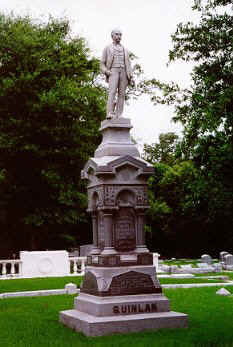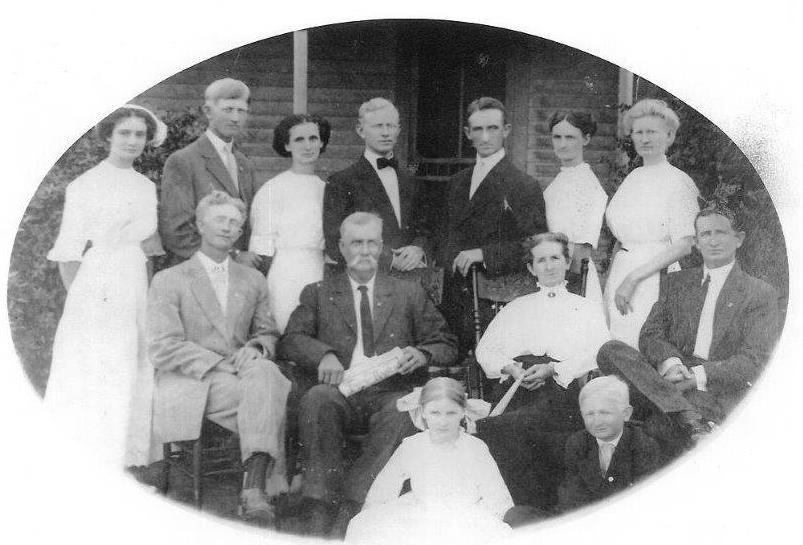 Trails of Our Past The Myth of Two Sisters For as long as I can remember I have heard countless tales
of how the naming of Anna, Melissa and Van Alstyne came about. Perhaps the most
common and most believed theory is that Mr. Van Alstyne had two daughters, Anna
and Melissa, thus the naming of all three towns. In fact, I have seen
references to this theory as early as the 1940’s. Just like many individuals
believe that the old site of Mantua is on the west side of highway 75 near the
old water tower, not realizing that the town was, in fact, on the east side just
southeast of where Kelly Ln. meets County Line Road - but that is a different
story in itself. For this article I am here to put in writing an end to the
elusive myth that the naming of the three before mentioned towns were in some
way connected through family relations…the only relation any of these towns
have with one another is mother railroad. As stated in a previous article, the land for Van Alstyne
was sold to the railroad from William L. McKinney, an orphan, and in 1873 the
town of Van Alstyne was officially underway. Many have stated that Van Alstyne
was named for William A. Van Alstyne, one of, if not the largest stock holder
in the railroad upon the creation of Van Alstyne. That’s pretty good for a man
who had passed away 6 years before…wouldn’t you say? The truth is, is that Van
Alstyne was actually named for his widow, Maria Hill Wright Van Alstyne, who
inherited her husband’s estate. There are even newspaper articles written that
boasted the title in the early part of the 20th century, “Van
Alstyne, only town in Grayson County, named after a woman!” Prior to her
marriage to Van Alstyne in 1843, Maria Hill had been married to F. B. Wright
and had two children: William B. “Frank” and Caroline. Mr. and Mrs. Van Alstyne
had three children: Maria Louisa, Mary Ashley and Albert A. Van Alstyne. That’s
right, no Anna nor Melissa. The Van Alstyne family were extremely prominent
citizens in Houston and were natives of New York and continued to make frequent
trips back to that state. Maria passed away in 1901. So famous and influential
were the Van Alstyne family that The Rice
Thresher, a Houston newspaper, reported on September 2, 1988 when
discussing an upcoming play that “Carol Younkin is the only other female member
of the cast, playing the vivacious Maria Van Alstyne, a friend of Rice’s in New
York.” Maria Van Alstyne, the rich, popular and influential citizen
of Texas for whom the town of Van Alstyne was named for, lies resting in an
unmarked grave in Houston, Texas near her husband. Like residents of Mantua quickly relocated to Van Alstyne when the railroad bypassed them, the same can be said for residents of Highland flocking to the new town of Melissa in 1872. The first postmaster of Melissa was James R. Rogers, having taken the job on May 16, 1873. Sources state that Melissa was named after a railroad official’s daughter. Some state that the railroad official was George A. Quinlan, while others state that Melissa was the daughter of C. P. Huntington. Research reveals that Quinlan did not have a daughter named Melissa nor was he a prominent official in the railroad at the time of the establishment of Melissa. It is still not known if C.P. Huntington had a daughter named, Melissa.
Anna remained nonexistent until the early 1880’s. The first
postmaster was appointed May 29, 1883… he having been William Y. Barnet. While
it is not entirely impossible, it is extremely unlikely that two towns formed
more than 10 years apart from one another were named after sisters…different
people were in charge at different times in regards to the naming of towns. Two
reliable sources are in existence in regards to the naming of Anna. The first
is that it was named for Anna Greer, daughter of John F. Greer who owned the
first store in Anna and also had the first residence in the town. However,
according to my research, Anna Lou Greer Walker was born August 12, 1883…that’s
several months after the post office had been established and had already been
given the name of Anna. I have heard that Anna was named for Anna Greer because
she was the first baby born in the town. The second part of this rumor is
probably true, however it appears that she was named for the town, rather than
the town for her. The other disproving fact to this scenario in regards to the
naming of the town is that Anna’s own brother wrote an article that Anna was
named for Anna Quinlan, daughter of railroad official, George A. Quinlan. Upon
doing research on the Quinlan family I discovered that George A. Quinlan and
his wife, Kate, had two children, Anna born 1878 and George A., Jr. born 1880.
Did you catch that? Anna Quinlan. Furthermore, research revealed in his wife’s
obituary in the early 1880’s that George A. Quinlan was Assistant
Superintendent of the Texas Central railway. After splashing through more
historic records I found that George A. Quinlan, although he resided in south
Texas, made frequent trips north through Collin and Grayson Counties all
throughout the 1880’s. In fact, he even owned land in Grayson County and
remember, Anna was created in 1883.' The last bit of evidence that I will throw out there in
regards to the naming of Anna is an official letter from the Southern Pacific
Company, dated May 19, 1964 which reads in part as follows: “Our records show
construction of the Houston & Texas Central, which later became a part of
the Texas and New Orleans Railroad, was started northward from Dallas in 1872,
and was completed through Anna to Denison in March, 1873. The T&NO, a
wholly owned subsidiary of Southern Pacific Company was merged into the parent
company in November 1961. As additional information, your city was named for Miss Anna
Quinlan, daughter of G. A. Quinlan, former superintendent of the H&TC.” Anna Quinlan was married to Ed Tom Randle, a lawyer from
Dallas. Quinlan, Texas was named for George A. Quinlan.  Statue of George Austin Quinlan, Sr. Glenwood Cemetery Houston, Harris Co., Texas  Trails of Our Past Van Alstyne History Susan Hawkins © 2024 Grayson County TXGenWeb |
